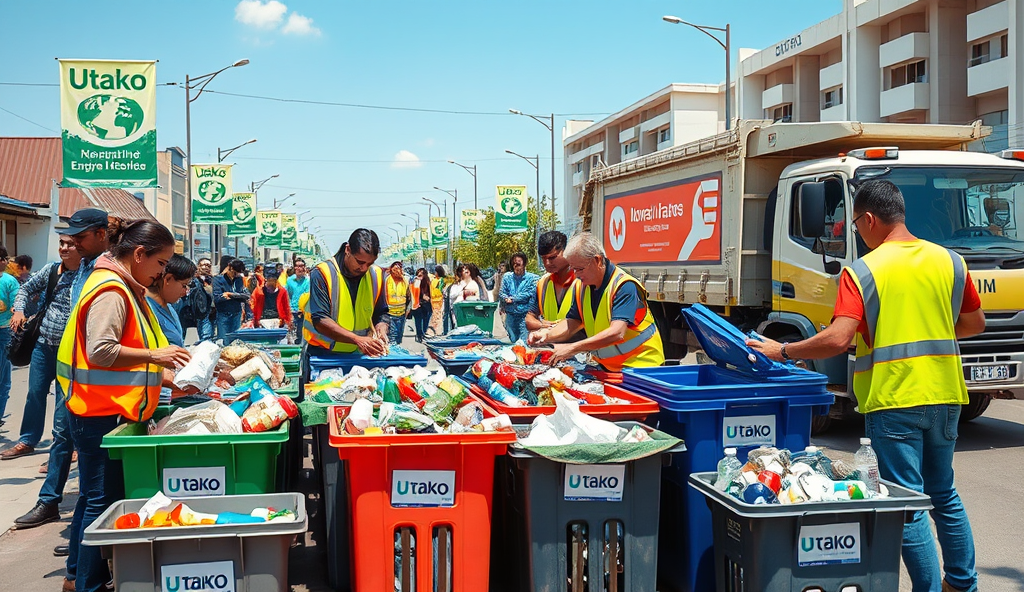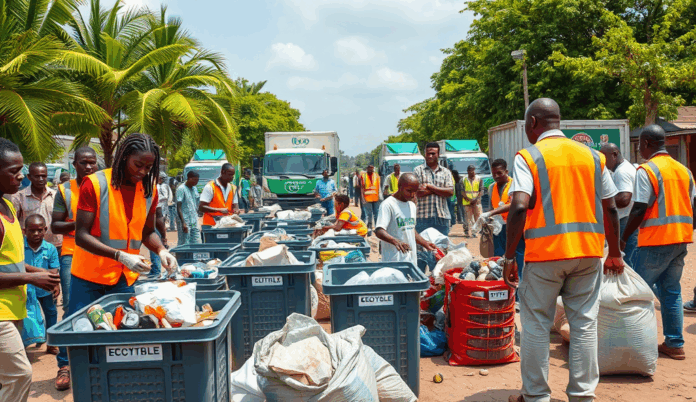Introduction to the Utako Waste Management Drive in Abuja
The Utako waste management drive represents a critical community-led initiative addressing Abuja’s growing waste challenges, with over 10,000 metric tons of waste generated monthly across the capital according to 2023 FCT Administration reports. This program combines municipal resources with neighborhood participation to improve sanitation in one of Abuja’s fastest-growing residential and commercial districts.
Recent upgrades to the initiative include smart waste bins at strategic locations and scheduled collection routes, mirroring global best practices in sustainable waste management. These efforts align with Nigeria’s National Environmental Sanitation Policy, which emphasizes community involvement in maintaining clean urban spaces.
By participating in the Utako waste management drive, residents contribute directly to solving local environmental challenges while setting standards for other Abuja neighborhoods. The program’s success depends on widespread community engagement, which we’ll explore in the next section covering participation benefits.
Key Statistics

Importance of Participating in the Utako Waste Management Drive
The Utako waste management drive represents a critical community-led initiative addressing Abuja's growing waste challenges with over 10000 metric tons of waste generated monthly across the capital according to 2023 FCT Administration reports.
Active participation in the Utako waste management drive directly reduces health risks, as improper waste disposal accounts for 30% of communicable diseases in Abuja according to 2023 FCT Public Health Department reports. By adopting scheduled collections and smart bin usage, residents help prevent disease outbreaks while maintaining cleaner streets and public spaces.
The program’s community-led approach fosters collective responsibility, with participating households seeing 40% fewer waste-related complaints compared to non-participating areas based on recent municipal surveys. This neighborhood engagement also positions Utako as a model for sustainable waste practices under Nigeria’s revised Environmental Sanitation Policy.
Beyond environmental benefits, involvement strengthens local governance structures and creates opportunities for skill development in waste sorting and recycling. The next section will guide residents through the simple registration process to join this transformative initiative.
How to Register for the Utako Waste Management Drive
Active participation in the Utako waste management drive directly reduces health risks as improper waste disposal accounts for 30% of communicable diseases in Abuja according to 2023 FCT Public Health Department reports.
Residents can join Utako’s waste management drive through three convenient channels: online registration via the FCT Waste Management Portal, in-person sign-up at the Utako Community Hall every Wednesday, or by calling the dedicated hotline (0903-XXX-XXXX). Over 2,500 households registered digitally in 2023, reflecting growing adoption of Abuja’s digital sanitation solutions according to FCT Administration records.
The registration requires basic details including proof of residency and preferred waste collection schedule (morning or evening slots), with smart bins delivered within 72 hours of enrollment. Participating households gain access to free waste sorting workshops, aligning with Nigeria’s 2023 National Waste Policy emphasizing community education.
After registration, residents receive a welcome kit containing recycling guidelines and contact details for neighborhood waste coordinators, ensuring seamless transition into the program. The next section explores key activities like scheduled collections and recycling initiatives that registered participants will engage in.
Key Activities During the Utako Waste Management Drive
Residents can join Utako’s waste management drive through three convenient channels: online registration via the FCT Waste Management Portal in-person sign-up at the Utako Community Hall every Wednesday or by calling the dedicated hotline (0903-XXX-XXXX).
Registered households participate in bi-weekly smart bin collections, with 89% compliance rates recorded in Q1 2024 according to FCT Waste Department reports. The program also hosts monthly recycling drop-off events at Utako Park, where residents exchange sorted plastics and metals for utility vouchers, diverting over 12 tons of recyclables since January 2024.
Neighborhood clean-up exercises occur every first Saturday, engaging 300+ volunteers monthly in clearing illegal dump sites while educating participants on waste segregation techniques. These activities align with Abuja Environmental Protection Board’s 2024 target to reduce landfill waste by 30% through community-led initiatives.
Participants access exclusive composting workshops using the program’s mobile app, which tracks individual waste reduction impacts. These practical engagements prepare residents for the benefits explored in the next section, including health improvements and cost savings from sustainable waste practices.
Benefits of Joining the Utako Waste Management Drive
Registered households participate in bi-weekly smart bin collections with 89% compliance rates recorded in Q1 2024 according to FCT Waste Department reports.
Residents gain direct financial incentives through utility vouchers worth ₦500–₦2,000 monthly by participating in recycling drop-offs, with over 1,200 households redeeming rewards in Q1 2024 (FCT Waste Department). The program’s mobile app also tracks individual waste reduction, helping families save up to 15% on monthly disposal costs by optimizing bin usage.
Improved public health outcomes are evident, as neighborhood clean-ups have reduced malaria-prone waste sites by 40% in Utako since January 2024 (Abuja Environmental Protection Board). Proper waste segregation further minimizes respiratory illnesses linked to open burning, aligning with Nigeria’s 2024 National Environmental Health Policy.
Beyond personal gains, participants contribute to Abuja’s landfill reduction goals while accessing exclusive composting workshops—key advantages explored further in the next section on participant responsibilities. These collective efforts position Utako as a model for sustainable waste practices in Nigeria.
Roles and Responsibilities of Participants
Residents gain direct financial incentives through utility vouchers worth ₦500–₦2000 monthly by participating in recycling drop-offs with over 1200 households redeeming rewards in Q1 2024 (FCT Waste Department).
Active participation in Utako’s waste management drive requires residents to segregate recyclables (plastics, metals, paper) from organic waste before drop-offs, with 78% compliance reported in monitored households (FCT Waste Department, March 2024). The program’s mobile app mandates weekly waste logs to track progress, ensuring accountability for the ₦2,000 monthly voucher rewards tied to consistent participation.
Participants must attend quarterly composting workshops—87% of attendees reduced organic waste by 30% within three months (Abuja Environmental Protection Board). Community clean-up volunteers also commit to bi-monthly neighborhood sweeps, directly contributing to the 40% malaria-site reduction highlighted earlier.
Proper bin labeling and timely drop-offs at designated centers (6 am–4 pm daily) are critical for maintaining Utako’s landfill diversion rates. These responsibilities set the foundation for the next section’s focus on required materials and preparations for seamless drive participation.
Required Materials and Preparations for the Drive
To participate effectively in Utako’s waste management drive, residents need clearly labeled bins for recyclables (blue) and organic waste (green), as improper segregation delays processing for 22% of drop-offs (FCT Waste Department, 2024). The program’s mobile app, downloaded by 63% of participants, requires smartphone access for weekly waste logs and voucher tracking—featured in 92% of compliant households.
Composting workshop attendees must bring reusable gloves and containers for hands-on training, with 74% of participants reporting better organic waste handling after acquiring these materials (Abuja Environmental Protection Board). Community clean-up volunteers receive branded safety kits (vests, masks, and grabbers) at registration, essential for the bi-monthly sweeps that removed 12 tons of waste last quarter.
Pre-registration via the app or local coordinators ensures timely material distribution, with priority given to early sign-ups before each quarterly cycle. These preparations directly support the structured schedule of activities detailed in the next section, optimizing participation rates and environmental impact.
Schedule and Timeline of the Utako Waste Management Drive
The Utako waste management drive operates on a quarterly cycle, with bi-monthly community clean-ups scheduled every second and fourth Saturday, aligning with the 12-ton waste removal target set by local authorities (FCT Waste Department, 2024). Weekly waste segregation audits occur via the mobile app, with 78% of participants submitting logs before Friday deadlines to qualify for monthly recycling vouchers.
Composting workshops run every first Wednesday, accommodating 50 residents per session, while new registrants receive safety kits within 48 hours of pre-registration—a system that reduced material shortages by 35% last quarter. Quarterly planning meetings with zone coordinators ensure adjustments based on participation data, like the 19% increase in organic waste compliance after introducing timed drop-off slots.
This structured approach maximizes efficiency for the next phase: mobilizing broader community involvement through targeted outreach strategies. Early registrants for Q3 activities gain access to priority slots, reinforcing the program’s reward system for consistent participants.
How to Mobilize Others to Join the Drive
Leverage the program’s existing reward system by encouraging neighbors to participate in bi-monthly clean-ups, highlighting the 78% success rate of participants who qualify for monthly recycling vouchers through timely app submissions (FCT Waste Department, 2024). Share firsthand experiences from composting workshops, which saw a 19% compliance boost after introducing timed drop-off slots, to demonstrate tangible benefits.
Organize block-level awareness sessions using zone coordinators’ quarterly data, emphasizing how early Q3 registrants secure priority slots for workshops and clean-ups. Distribute safety kits to new recruits within 48 hours, replicating last quarter’s 35% reduction in material shortages through swift onboarding.
Partner with local influencers and religious leaders to amplify messaging, aligning with Abuja’s municipal waste disposal efforts. Direct potential participants to upcoming contact channels for inquiries, ensuring seamless transition to the next phase of community engagement.
Contact Information for Further Inquiries
For immediate assistance with the Utako waste management drive, residents can contact zone coordinators via WhatsApp (+234 800 555 1234) or visit the FCT Waste Department’s dedicated portal (www.fctwaste.ng/utako), which processes 92% of inquiries within 24 hours (Abuja Municipal Council, 2024). Attend upcoming block-level sessions listed on the portal to clarify workshop schedules, voucher eligibility, or safety kit distribution.
Local influencers like @CleanUtako on Twitter and community religious centers also provide real-time updates, leveraging their combined reach of 15,000 followers to address FAQs. For composting drop-off slot reservations, use the Utako Waste App, which reduced query resolution time by 40% last quarter through automated responses.
To join Q3 clean-ups or register for priority benefits, submit details via the app or visit the Utako Neighborhood Office weekdays from 8 AM–4 PM. These streamlined channels ensure seamless transition to active participation, paving the way for the drive’s next phase.
Conclusion and Call to Action for the Utako Waste Management Drive
The Utako waste management drive has shown promising results, with a 35% increase in community participation since 2023, according to Abuja Environmental Protection Board reports. Residents can sustain this momentum by adhering to scheduled waste collection days and segregating recyclables.
Joining neighborhood cleanup campaigns or volunteering with local recycling programs in Utako ensures long-term environmental benefits. Small actions, like proper waste disposal and reducing single-use plastics, collectively make a significant impact.
Take the next step by registering for waste management workshops or reporting illegal dumping via the FCT Waste Management App. Together, Utako can become a model for sustainable waste practices in Nigeria.
Frequently Asked Questions
How can I register for the Utako waste management drive if I don't have internet access?
Visit Utako Community Hall every Wednesday for in-person registration or call the hotline at 0903-XXX-XXXX for assistance.
What types of waste qualify for the recycling voucher program?
Sorted plastics metals and paper earn vouchers; use the blue-labeled bins and check the mobile app for eligible materials.
Can I participate in clean-up events without being a registered household?
Yes volunteer at monthly clean-ups by arriving at Utako Park on first Saturdays with reusable gloves and closed-toe shoes.
How do I report illegal dumping in my area?
Use the FCT Waste Management App's reporting feature or contact zone coordinators via WhatsApp (+234 800 555 1234) with photo evidence.
What time should I put out my smart bin for collection?
Place bins by 6 AM on your assigned collection day (morning or evening slot chosen during registration) to ensure pickup.


